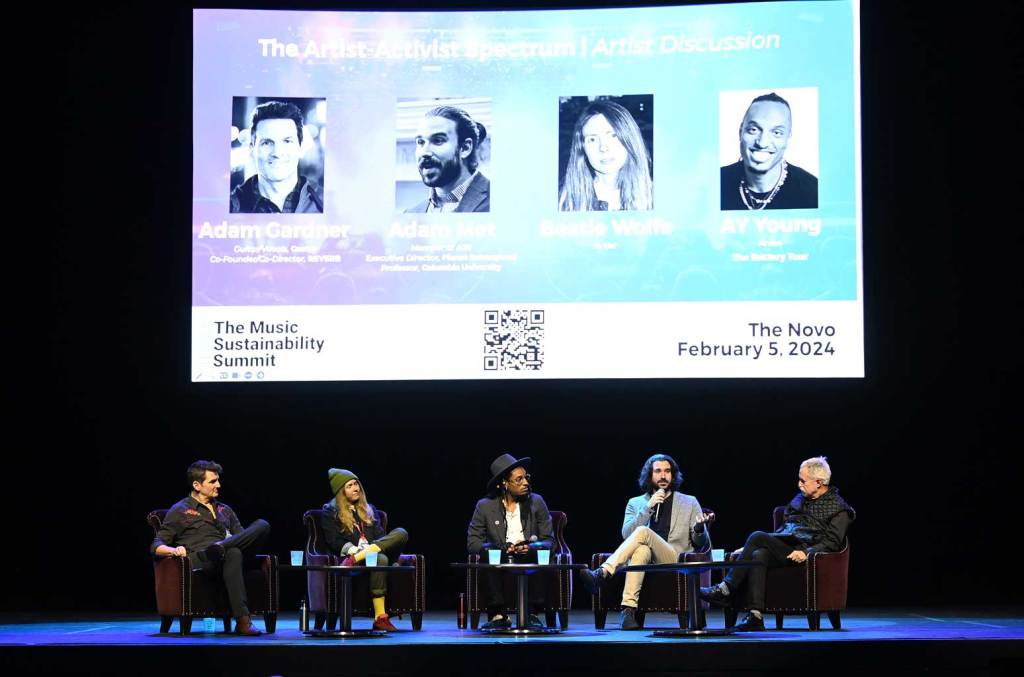Last Monday (February 5), around 300 people from all walks of life gathered at The Novo Theater in downtown Los Angeles for the first time – always a summit on the climate of the North American music industry. Outside, sheets of rain fell during unusually strong Southern California storms, adding a sense of urgency — and purpose — to an event meant to catalyze the music industry into taking meaningful action on the issue.
Organized by the Music Sustainability Alliance (MSA) – a non-partisan body that acts as a sustainability body and resource for the entire industry – the Music Sustainability Summit featured eight hours of panels on climate-related topics, from the carbon emissions associated with travel to fans to environmentally responsible food sourcing at events. Attendees were encouraged to (and did) bring their own water bottles and lanyards, with reusable cups available and a plant-based lunch served with bamboo plates and cutlery.
The event was a watershed moment for the music industry's relationship with climate change, marking the first time leaders from all sectors of the industry came together to discuss the issue and commit to creating systemic change. The excitement surrounding the event – which had to move to a larger venue to accommodate interest and drew large crowds even in bad weather – showed that the industry is willing, even desperate, to become more sustainable and use the platform of music to inspire and catalyze a cultural movement for climate action.
Beyond knowledge sharing, the summit succeeded in bringing together stakeholders in the music industry's fight against climate change, consolidating and expanding this community, and supporting the collective knowledge base. The summit was hosted by Joel Makower, a business sustainability expert and journalist whose depth of knowledge on the subject was combined with a thoughtful, often funny demeanor that brought levity to an often very existential seeming problem.
“The good news that we don't hear enough about is that we already have climate change solutions that work and are affordable,” noted one panelist. “How do I know this? Because we have scientist the s— out of it.”
(The summit was held under the Chatham House Rule, which advises that anyone who comes to a meeting is free to use information from that meeting, but is not allowed to reveal who made any particular comment. This rule was established so that the participants of the summit could speak freely in order for the event to have the highest impact. Advertising sign was the media sponsor of the Summit and has agreed to comply with these Rules.)
MSA representatives say Advertising sign that after the summit, the plan is to continue the momentum through the formation of working groups. The MSA — head of the president and co-founder Amy Morrisondirector Eleanor Andersonco-founder and board member Michael Martin and board member Kurt Langer — will act as an administrator for these groups, helping people connect, organize meetings and take notes to ensure conversations turn into action.
MSA will also host monthly webinars to focus on specific topics. The first one next month will be about voting and how the industry can use its platforms to encourage the public to be climate-conscious voters. The summit will become an annual event, scheduled to take place each year the day after the Grammys. In addition, MSA is working on accessible online content, including an updated resource guide and other educational materials.
Music Sustainability Alliance staff Kurt Langer, Amy Morrison, Eleanor Anderson and Michael Martin
Gilbert Flores
A critical part of the plan is for workers from competing companies to engage with each other in a pre-competitive environment to share information and take action that will be necessary for all companies to enact to effectively address climate change. The summit showed those pre-competitive talks are possible, with a panel including chief sustainability officers from Live Nation, AEG, ASM Global and Oak View Group telling the audience they were all friendly anyway between them.
Here are some of the many things we learned at the launch event.
The music industry has an outsized influence on the issue
Although it is not yet clear how much carbon emissions the music industry is responsible for, it is likely that this number is relatively small compared to other industries. But the industry's influence on climate change is huge, with many speakers stressing that because music affects culture – and the hearts, minds and motivations of listeners – the impact the industry can have on the issue is huge .
“Music creates culture,” observed one speaker, and thus determines “what things in culture are normalized.”
Artists can do a lot, but they can't do everything
There has been much discussion about the impact artists can have in educating their audiences about climate change and motivating fans to take action. These discussions noted that authenticity is key to successful initiatives and that fans find it most inspiring when artists take action with them. Billie Eilish's sustainability efforts were mentioned multiple times throughout the day, including a statistic that 130,000 fan actions resulted from Eilish's climate change initiatives during her latest tour.
These discussions advised, however, that artists cannot shoulder the burden of responsibility alone, with everyone in the industry responsible for taking action while also working with lawmakers.
Practical solutions are available now
A presentation on waste management noted that four billion disposable cups are thrown away each year at live events. But the music industry is leading the reuse movement in the United States through a company called r.Cup — which provides reusable cups to venues and festivals and has eliminated 43 tons of plastic so far. Both AEG and Live Nation have successfully used reusable programs at various events.
Emissions: Fan travel is the top issue
In terms of energy use, a panel on diesel fuel noted that the fastest way to decarbonise the music industry would be to remove diesel generators from event venues. While this measure is currently cost-prohibitive and not yet possible, as most legacy rental companies would need a massive infrastructure upgrade to make it happen, the panel stressed that the technology is possible to make it happen.
This conversation also included the use of HVO (renewable diesel) which reduces CO2 emissions by 90%, along with discussion of the option for currently available batteries to replace diesel generators in ancillary uses such as parking lots and venue lighting etc. . The hybrid use of batteries and generators were also discussed.
During the panel, it was noted that fan travel contributes 50-80% of the music industry's carbon emissions, an acute problem given that many festivals are held in far-flung locations and that even many cities connected to the network do not offer public means of transport . This conversation highlighted the need for organizers, venues, festival producers, fans, artists and municipalities to work together.
Food is a critical piece of the puzzle — and acting on it can happen now
With animal agriculture a major contributor to climate change, deforestation and air and water pollution, a food-focused panel showed that the industry – from massive arena concerts to video shoots to awards and conventions – can positively influence this through plant-based catering and concessions.
It was suggested that even large venues that get food from large, national distributors could open a vegetable concession stand at a local business or allow that business to park a food truck outside. Changing menus to include plant-based options is possible now and is a good place to start in terms of action that has the potential to change people's daily food choices.
Support And Feed, an organization founded by Eilish and Finneas' mother Maggie Baird, which works to mitigate climate change and increase food security by driving global demand, acceptance and accessibility of plant-based foods, is considered leader in this field. The food panel also reported that an estimated 8.8 million gallons of water were saved thanks to Eilish's latest tour switching to a plant-based focus.



